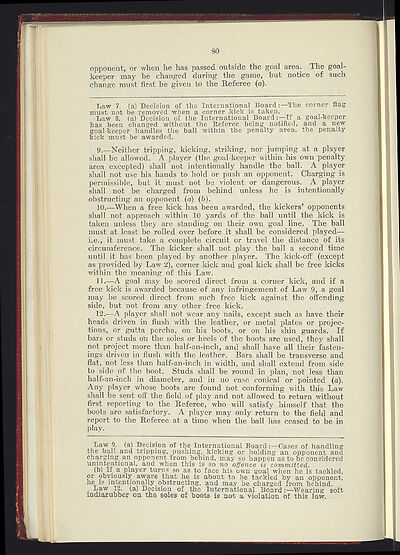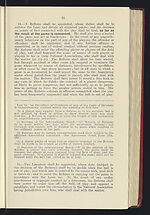1931
(86)
Download files
Complete book:
Individual page:
Thumbnail gallery: Grid view | List view

kwq..n~
so
opponent, or when he has passed outside the goal area. The goal-
keeper may be changed during the game, but notice of such
change must first be given to the Referee (a).
Law
7.
(a) Decision of the International Board:—The corner flag
must not be removed when a corner -kick is taken.
Law 8. (a) Decision of the International Board:—If a goal-keeper
has been changed without the Referee being notified, and a new
goal-keeper handles the ball within the penalty area., the penalty
kick must be awarded.
9.—Neither tripping, kicking, striking, nor jumping at a player
shall be allowed. A player (the goal-keeper within his own penalty
area excepted) shall not intentionally handle the ball. A player
shall not use his hands to hold or push an opponent. Charging is
permissible, but it must not be violent or dangerous. A player
shall not be charged from behind unless he is intentionally
obstructing an opponent (a) (b).
10.—When a free kick has been awarded, the kickers' opponents
shall not approach within 10 yards of the ball until the kick is
taken unless they are standing on their own goal line. The ball
must at least be rolled over before it shall be considered played—
i.e., it must take a complete circuit or travel the distance of its
circumference. The kicker shall not play the ball a second time
until it has been played by another player. The kick-off (except
as provided by Law 2), corner kick and goal kick shall be free kicks
within the meaning of this Law.
11.—A goal may be scored direct from a corner kick, and if a
free kick is awarded because of any infringement of Law 9, a goal
may be scored direct from such free kick against the offending
side, but not from any other free kick.
12.—A player shall not wear any nails, except such as have their
heads driven in flush with the leather, or metal plates or projec-
tions, or gutta percha, on his boots, or on his shin guards. If
bars or studs on the soles or heels of the boots are used, they shall
not project more than half-an-inch, and shall have all their fasten-
ings driven in flush with the leather. Bars shall be transverse and
flat, not less than half-an-inch in width, and shall extend from side
to side of the boot. Studs shall be round in plan, not less than
half-an-inch in diameter, and in no case conical or pointed (a).
Any player whose boots are found not conforming with this Law
shall be sent of£ the field of play and not allowed to return without
first reporting to the Referee, who will satisfy himself that the
boots are satisfactory. A player may only return to the field and
report to the Referee at a time when the ball has ceased to be in
play.
Law 9. (a) Decision of the International Board :—Cases of handling
the ball and tripping, pushing, kicking or holding an opponent and
charging an opponent from behi
n
d,
may
so
h
appen
as to be considered
unintentional, and when this
is so no offence is committed.
(b) If a player turns so as to face his own goal when he is tackled,
or obviously aware that he is about to be tackled by an opponent,
he is intentionally obstructing, and may be charged from behind.
Law
i2.
(a) Decision of the International Board:—Wearing soft
indiarubber on the soles of boots is not a violation of this law.
so
opponent, or when he has passed outside the goal area. The goal-
keeper may be changed during the game, but notice of such
change must first be given to the Referee (a).
Law
7.
(a) Decision of the International Board:—The corner flag
must not be removed when a corner -kick is taken.
Law 8. (a) Decision of the International Board:—If a goal-keeper
has been changed without the Referee being notified, and a new
goal-keeper handles the ball within the penalty area., the penalty
kick must be awarded.
9.—Neither tripping, kicking, striking, nor jumping at a player
shall be allowed. A player (the goal-keeper within his own penalty
area excepted) shall not intentionally handle the ball. A player
shall not use his hands to hold or push an opponent. Charging is
permissible, but it must not be violent or dangerous. A player
shall not be charged from behind unless he is intentionally
obstructing an opponent (a) (b).
10.—When a free kick has been awarded, the kickers' opponents
shall not approach within 10 yards of the ball until the kick is
taken unless they are standing on their own goal line. The ball
must at least be rolled over before it shall be considered played—
i.e., it must take a complete circuit or travel the distance of its
circumference. The kicker shall not play the ball a second time
until it has been played by another player. The kick-off (except
as provided by Law 2), corner kick and goal kick shall be free kicks
within the meaning of this Law.
11.—A goal may be scored direct from a corner kick, and if a
free kick is awarded because of any infringement of Law 9, a goal
may be scored direct from such free kick against the offending
side, but not from any other free kick.
12.—A player shall not wear any nails, except such as have their
heads driven in flush with the leather, or metal plates or projec-
tions, or gutta percha, on his boots, or on his shin guards. If
bars or studs on the soles or heels of the boots are used, they shall
not project more than half-an-inch, and shall have all their fasten-
ings driven in flush with the leather. Bars shall be transverse and
flat, not less than half-an-inch in width, and shall extend from side
to side of the boot. Studs shall be round in plan, not less than
half-an-inch in diameter, and in no case conical or pointed (a).
Any player whose boots are found not conforming with this Law
shall be sent of£ the field of play and not allowed to return without
first reporting to the Referee, who will satisfy himself that the
boots are satisfactory. A player may only return to the field and
report to the Referee at a time when the ball has ceased to be in
play.
Law 9. (a) Decision of the International Board :—Cases of handling
the ball and tripping, pushing, kicking or holding an opponent and
charging an opponent from behi
n
d,
may
so
h
appen
as to be considered
unintentional, and when this
is so no offence is committed.
(b) If a player turns so as to face his own goal when he is tackled,
or obviously aware that he is about to be tackled by an opponent,
he is intentionally obstructing, and may be charged from behind.
Law
i2.
(a) Decision of the International Board:—Wearing soft
indiarubber on the soles of boots is not a violation of this law.
Set display mode to:
![]() Universal Viewer |
Universal Viewer | ![]() Mirador |
Large image | Transcription
Mirador |
Large image | Transcription
| Games and sports in the army > 1931 > (86) |
|---|
| Permanent URL | https://digital.nls.uk/248672493 |
|---|
| Description | 'Games and Sports in the Army' was an annual publication produced by the British War Office between the 1930s and 1960s. This included the Second World War. It outlines the rules and regulations for games and sports played by members of the armed forces. It features names and photographs of team members, and examples of contemporary advertising. |
|---|---|
| Shelfmark | GWB.52 |

